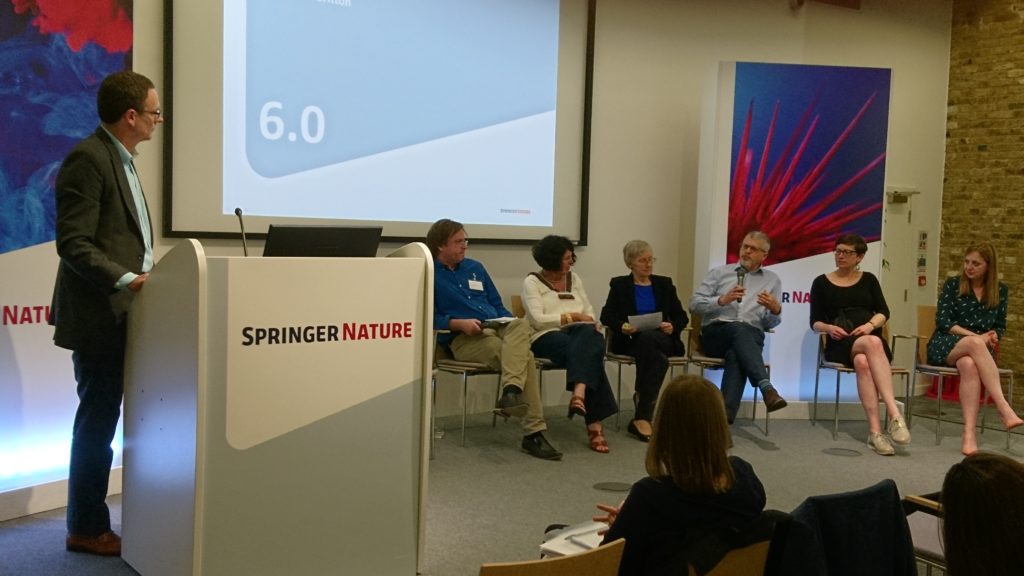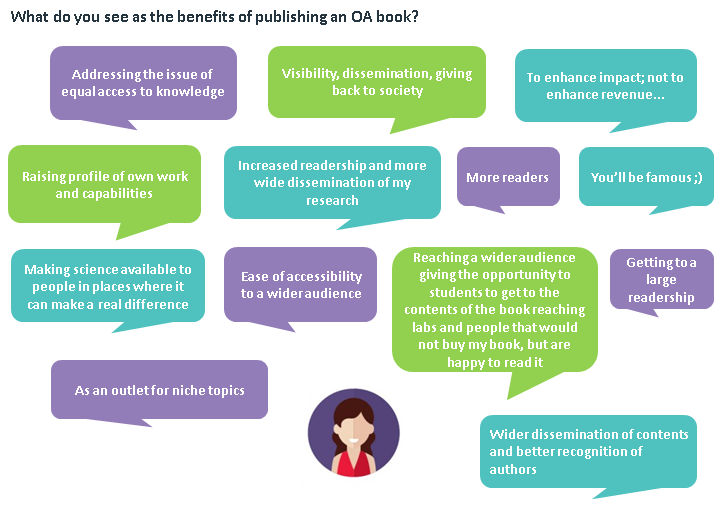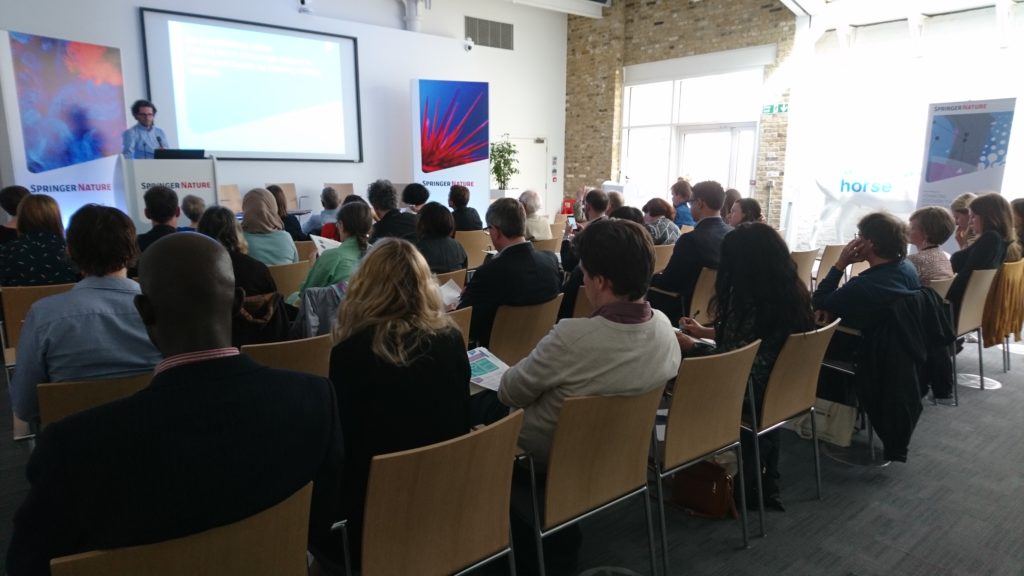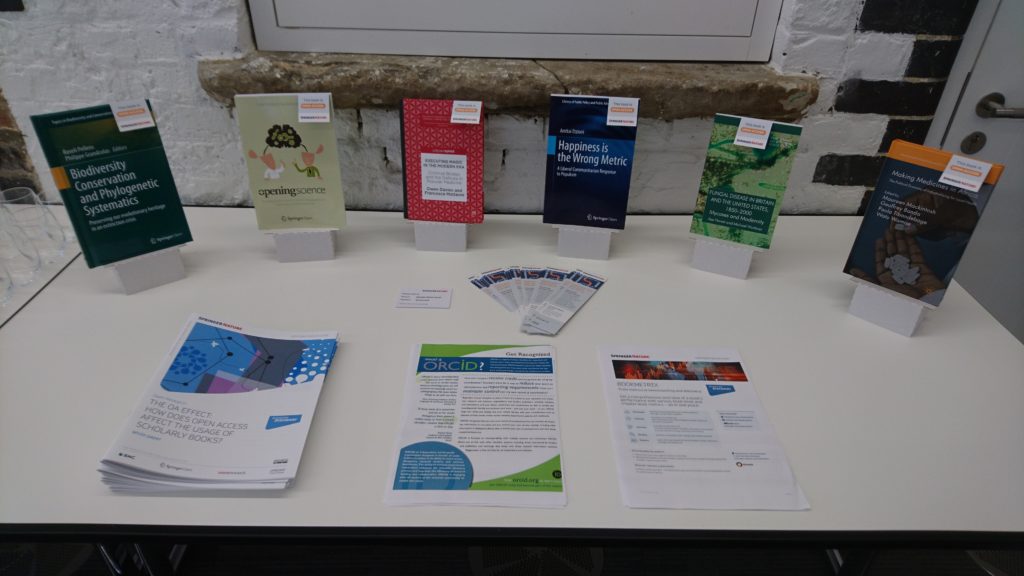To kick off Academic Book Week in April, Springer Nature held a free event for researchers exploring open access (OA) books, discussing topics such as why academics publish OA books, how the impact of their research can be tracked, and the future of OA book funding. Researchers in the hard sciences are more familiar with the concept of open access article publishing, but we were interested in talking to researchers across various disciplines, including the Humanities and Social Sciences, specifically about OA books.
You can read what the event speakers had to say in our recent LSE Impact blog but we wanted to share with you here what researchers who attended the event think about open access books.

Setting the scene
More than 30 researchers attended from a variety of subject areas from the Humanities and Social Sciences to Physics, Engineering and Computer Science. From pre-event registration information, we knew that 56% had previously authored an academic book before, but none had experience with publishing an OA book, whereas two authors had previously published an OA article. Researchers came from institutions such as Imperial College London, LSE and Coventry University as well as from industry.
We discussed the benefits of OA books, asked authors about their opinions and experiences, and looked at the challenge of finding funding for OA books.
What are the benefits of OA books?
The Springer Nature report ‘The OA effect: How does open access affect the usage of scholarly books?’ established that there is a performance benefit from publishing a book OA:
- Downloaded seven times more: On average, there are just under 30,000 chapter downloads per OA book within the first year of publication, which is 7 times more than for the average non-OA book.
- Cited 50% more: Citations are on average 50% higher for OA books than for non-OA books, over a four-year period.
- Mentioned online ten times more: OA books receive an average of 10 times more online mentions than non-OA books, over a three-year period.
Did researchers agree?
Event attendees echoed these benefits when asked during the event and through a post-event survey. They elaborated, highlighting equal access, wider dissemination, increased impact and career benefits as the main reasons they saw for choosing to publish an OA book.
- “Wider dissemination of research results” (Computing researcher)
- “Larger impact outside academia (e.g. industry)” (Physics researcher)
- “Wider scientific development” (Humanities/Medicine researcher)
- “Career requirement” (History/Politics researcher)

Two thirds agreed that ‘OA books help to advance discovery and research more than non-OA books’ and 86% were of the opinion that ‘OA books help disseminate knowledge further than non-OA books’.
Before the event, 75% of the respondents ‘did not feel very informed about OA books’ but in our post-event survey, 100% of respondents now feel ‘quite’ or ‘very informed’ about OA books
All in all, 53% of respondents said that the event had made them either ‘somewhat more likely’, or ‘more likely’, to publish an OA book.

What is the main challenge?
However when asked how likely they were to actually publish an OA book in the future, only 20% of respondents said that they were ‘very likely’ to publish an OA book. This is primarily due to concerns around access to funding, which was a hot topic on the day:
- “I doubt that I will have access to research grants or institutional funds to support this.”
- “I have to spend some more time investigating the likelihood of securing funds from my associated research institution.”
- “I would love to do so, but I’m doubtful about getting funding.”

What is the solution?
According to Hannah Hope, Open Research Coordinator at the Wellcome Trust, she would like to see OA become more affordable for all, and to support a wider transition to OA: “We would like more funders to support their researchers with the costs of making research available. We would like more publishers and institutions to work together as a community to share costs and reduce them for researchers. There is funding within the research ecosystem but we need to repurpose budgets. We all have to change the ecosystem.”
Springer Nature is committed to helping researchers from all over the world make their research freely available as we see the rise of open research in all its manifestations as one of the major forces reshaping the way that researchers communicate and collaborate to advance the pace and quality of discovery. To help authors discover and apply for open access funding, they can get in touch with our free Funding Support Service.
After conducting author interviews for ‘The OA Effect’ we recognised that wider engagement with researchers was key to increasing understanding of OA and we were delighted with the interest in this event. We would love to hear from institutions who would be interested in hosting presentations on OA books as a continuation of this direct outreach. We learned that researchers are interested in OA books, and we would like to put out a call to the community for publishers and institutions alike to talk to the academic community more.
Thank you to all speakers who participated in the event:
- Owen Davies (History), University of Hertfordshire
- Maureen Mackintosh (Economics), The Open University
- Roseli Pellens (Macroecology), Institut de Systématique, Evolution, Biodiversité, Paris
- Hannah Hope (Open Research Coordinator), Wellcome Trust
- Christina Brian (Editorial Director, Politics & International Studies), Palgrave Macmillan
- Stephen Partridge (Editorial Director, Business, Economics & Finance), Palgrave Macmillan
- Tim Britton (Managing Director, Open Research), Springer Nature
- Ros Pyne (Head of Policy & Development, Open Research), Springer Nature
- Martijn Roelandse (Head of Publishing Innovation), Springer Nature
Learn more
- Slides and recordings from the event can be found here.
- Read the LSE Impact Blog post.
- If you would like to talk to us about a proposal for an OA book, chapter or partnership series, please get in touch: OAbooks@springernature.com
- Learn more about OA books at Springer Nature.
- Follow us on Twitter at @SN_OAbooks.
Comments